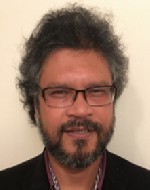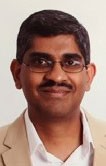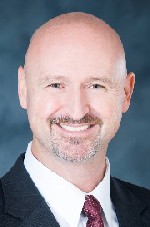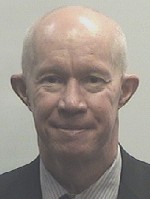Monday, 23 September 2019 |
6pm–8pm
UAV to UAV Communications: Options, Challenges, and Standards
| Moderator: | Kamesh Namuduri, University of North Texas |
| Panelists: | Arup Bhuyan, Idaho National Laboratory |
| Gürkan Gür, Zurich University of Applied Sciences | |
| Ravi Pragada, InterDigital | |
| Stephen Hayes, Ericsson | |
| Dallas Brooks, Mississippi State University | |
| Alistair Munro, Digital Catapult |
Summary—Before unmanned air transportation can become a reality, there are several technical challenges that need to be addressed by the research community. The most important among them is the need for enhanced situational awareness for UAVs in the airspace. UAV-to-UAV Communications is the key for enhanced situational awareness. It facilitates Beyond Radio-Line-of-Sight Communications, Deconfliction strategies, and sharing of situational awareness information between the UAVs. The panel discusses the options for UAV-to-UAV communications including satellite, cellular, and aerial communications. Standardization efforts including IEEE P1920.1, IEEE 1920.2, 3GPP, ASTM, RTCA, and EUROCAE will be covered. |
|
Biographies | |
 Kamesh Namuduri is a Professor of Electrical Engineering and the director of Autonomous Systems Laboratory at the University of North Texas (UNT). He received his B.S. degree in Electronics and Communication Engineering from Osmania University, India, in 1984, M.S. degree in Computer Science from University of Hyderabad in 1986, and Ph.D. degree in Computer Science and Engineering from University of South Florida in 1992. Over the past eleven years, his research is focused on aerial networking and communications. He co-organized a series of workshops on “Airborne Networking and Communications” in conjunction with IEEE, AIAA, AUVSI, and ACM Conferences. He is serving as the chair for two Standards Working Groups (IEEE 1920.1: Aerial Communications and Networking and IEEE 1920.2: Vehicle-to-Vehicle Communications for Unmanned Aircraft Systems). He is serving as the Chair for the IEEE Vehicular Technology Society’s Ad Hoc Committee on Drones. He is a co-editor for the book titled “UAV Networks and Communications” published by the Cambridge University Press in 2017. He is leading the Smart and Connected Community project on “Deployable Communication Systems” in collaboration with the government, public, and private organizations. This living laboratory project was demonstrated thrice during the Global City Teams Challenge hosted jointly by the National Institute of Standards and Technology and US Ignite in 2015, 2016, 2017, and 2018. He contributed to the development of research agenda, requirements and blueprints highly deployable communications systems led by the National Institute of Standards and Technology and National Public Safety Telecommunications Council. |
 Arupjyoti (Arup) Bhuyan is a wireless researcher in the Idaho National Laboratory (INL) and the Technical Director of the INL Wireless Security Institute. The focus of his research is on secure implementation of future generations of wireless communications with scientific exploration and engineering innovations across the fields of wireless technology, cybersecurity, and computational science. Specific goals are to assure communications among critical infrastructure systems supporting control of the electric grid, emergency response, and nationwide unmanned aerial systems. Arup has extensive industry experience in wireless communications from his work before he joined INL in October, 2015. He received his Ph.D. in Engineering and Applied Sciences from Yale University. He is a senior member of IEEE. |
 Gürkan Gür is a senior researcher at Zurich University of Applied Sciences (ZHAW) InIT Information Security Group in Switzerland. He received his B.S. degree in electrical engineering in 2001 and Ph.D. degree in computer engineering in 2013 from Bogazici University in Istanbul, Turkey. His research interests include Future Internet, 5G networks, information security, and information-centric networking. He has two patents (one in US, one in TR) and published more than 50 academic works. He has been involved in various European ITEA and CELTIC as well as national Innosuisse and TUBITAK (TR) research projects as senior researcher, project coordinator and academic consultant. He is a senior member of IEEE and a member of ACM. |
 Ravi Pragada is a Senior Principal Engineer at InterDigital where he is responsible for leading next generation air-interface and system technologies. He has broad expertise covering incubation, pre-standards R&D, standardization, technology, product development and prototyping. He has actively contributed to and held leadership positions in various next generation wireless system projects viz., ultra-low power communications, AI/ML applied to wireless, sub-THz systems, unmanned aerial systems, millimeter wave air-interface/backhaul design and development, device-to-device communications, and beyond 5G architectures. Ravi is a prolific inventor with 180+ granted or pending international patent applications. He is a recipient of numerous innovation awards including InterDigital's Chairman's award, President's award, multiple CTO awards as well as Lucy Mahjobian distinguished publication award. Prior to InterDigital he was part of Tier 1 OEM team that developed RNC and NodeB infrastructure for 3GPP UMTS system. He is currently serving as vice-chair for the IEEE 1920.1: Aerial Communications and Networking Standards Working Group. |
 Stephen Hayes is the Director of Standards for Ericsson in North America. He has worked on various cellular issues over the last 20 years and been heavily involved in the evolution of the 3GPP family of technologies. His current focus includes the ATIS committees and 3GPP. He is also involved in several US advisory groups such as the FCC TAC (Technical Advisory Committee) where he chairs the subgroup on UAS spectrum issues. Stephen is currently the Vice-Chair of 3GPP TSG-RAN. Stephen was chairman of the 3GPP systems group (3GPP-SA) from 2006- 2011. Before that, Stephen was the chair of the Core Network group in 3GPP. Stephen is also the chair of the 3GPP group on working procedures. |
 Dallas Brooks is the Director, Raspet Flight Research Laboratory at Mississippi State University and the Associate Director of the ASSURE FAA UAS Center of Excellence. As the Raspet Director, he is responsible for MSU’s broad spectrum of government and commercial manned and unmanned aviation research, development, test and engineering programs. As the Associate Director for ASSURE, he develops and coordinates research strategies and focus areas for over 20 of the nation’s leading universities specializing in unmanned systems integration, safety, operations and policy. He also directs ASSURE’s UAS Safety Research Center, a national-level research facility that focuses on enhancing the safety and efficiency of UAS operations in a broad range of environments. Mr. Brooks is the Immediate Past Chairman of the Board of Directors for the Association of Unmanned Vehicle Systems International (AUVSI), the world's largest non-profit organization devoted exclusively to advancing the unmanned systems and robotics community. He also serves as co-chair of the Federal UAS Science and Research Panel, supporting 8 Federal agencies including the FAA, the DoD, NASA and DHS to identify and solve key UAS integration technical challenges. |
 Alistair Munro is currently Senior Expert Advisor on 5G at the Digital Catapult in London, UK. He worked previously at Airbus Defense and Space where he was Technical Lead for communications, spectrum management and security in the UK ASTRAEA project, which was concerned with the integration of unmanned aircraft systems into non-segregated airspace. Before that he held the Toshiba Chair in Communications Networks at Bristol University, UK. |

